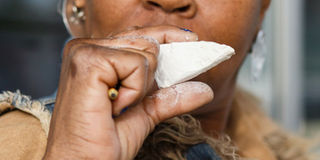Strong warning for pregnant women

A woman addicted to eating rock/soil. PHOTO | WEB
What you need to know:
As women develop a craving for eating soil, researchers have warned that eating soil can be dangerous. The habit is born out of many misconceptions such as a cure of nausea or low-iron.
Pregnant women who crave for soil-like materials sold on street market may have to rethink this habit after researchers confirmed that the practice, known as geophagy, carries health risks to them and their unborn babies.
In a study carried out in 12 regions across Tanzania, the researchers found abnormally higher levels of the toxic chemical elements such as Lead, Arsenic, Nickel, Cadmium and Aluminum, which were present in the commercialised soils.
“We took soil samples from sources of production in 12 regions and analysed the contents through laboratory techniques,’’ said Mr Elias Nyanza from the Catholic University of Health and Allied Sciences (CUHAS), as he described how the study was done.
“We have no problem with eating the commercialised soil but we are concerned about how it is processed and the sources,’’ he said.
“The practice should be discouraged until safety is guaranteed,” said Mr Nyanza, an environmental health scientist who collaborated with a team of researchers from the Universities of Colorado Denver in United States and Calgary in Canada.
Soil craving among women
Ms Sarah Kawira, a resident of Dar es Salaam, says she has refrained from eating the soil because her doctor said it was unhealthy to do so. “I also fear suffering from stomach problems. The doctor made me believe it’s bad to eat the soil,’’ she said.
“I know women who believe that they are addicted to munching the soil because it has an attractive smell,” she says.
“I have come to learn that eating soil is like smoking cigarettes because a person who smokes enjoys a certain flavour or smell. This is not necessarily good,’’ she points out. Some women eat the soil even when they are not pregnant. A petty trader, at Ubungo in the city, nick-named Mama Mchaga said the that most of her customers are pregnant women.
“There are also women who are not pregnant but they also like eating the soil. That’s’ why I continue to sell,’’ says Mama Mchaga who buys soil at wholesale price in Ilala Market to sell at retail price in her neighbourhood.
In Dar es Salaam, women who spoke to Your Health, admitted to have been consuming the soils without knowing if there were any health risks.
On the contrary, they believe eating the soil helps treat some of the problems they face during pregnancy. Some couldn’t explain why they were eating the soils, though.
When Mama Lucy got her first pregnancy, eight years ago, that was the first time she learnt that soil can be eaten, and to her, seeing women munching earth, chalk-like clay, had become a normal thing.
“I could see expectant women at antenatal clinics carrying packets of soil. One of them told me the soil increased her food appetite. Another one told me it helped her stop nausea. I didn’t buy the idea at that time,’’ she says.
“Later, when I got my second pregnancy, six years ago, I tried it out. Slowly, I started eating it and got addicted,” said the 35-year-old petty trader, a resident of Dar es Salaam.
But according to Dr Latifa Kalinga, a medical officer based in Songwe Regional Hospital, pregnancy is a period when women crave for many things, soil-eating being one if them.
Although some pregnant women eat the soils with the hope of treating anaemia, Dr Kalinga says, “There are those who eat stones even if they don’t have anaemia.”
“I think it’s important to educate the pregnant women that there is a higher risk of being infested with worms in the soils. The worms may later cause anaemia in pregnancy instead.”
The craving proven dangerous
Mr Nyanza further revealed that some chemicals such as Lead, Cadmium and Arsenic have been documented in the United States Agency for Toxic substances and Diseases registry, and are known to affect health and birth outcomes even at very low levels.
“Most of the chemical elements found in the soils popular as Pemba, are far above the recommended safe levels as per World Health Organisation chemical exposure guidelines ,’’ said Mr Nyanza.
“We found women eating soil containing 50 to 60 microgram/litre levels of some of the substances while the WHO recommended level is 10 micrograms/ litre,’’ he says.
“Consuming this, increases the chances for stillbirths, low birth weight, preterm birth and in some cases could lead to birth-defects including increasing the risk of infant mortality,’ he further warned.
The Chief Government Chemist, Professor Samuel Manyere has proposed that the researchers take the samples collected during the study to the Government Chemist Laboratory Agency (GCLA) so that further steps and possible interventions can be taken.
“We at GCLA haven’t per se carried out a study on that. However, it would have been appropriate if they submit the samples they have collected so that we can assess what they claim. We have the technology to be able to establish the contents in their samples,’’ he told Your Health in an interview at his office.
The study, titled: “Assessment of health risks of chemical element content for commercialised sikor in Tanzania,” was carried out in regions: Kilimanjaro, Lindi, Kigoma, Mara, Southern Pemba, Morogoro, Rukwa as well as Dar es Salaam, Singida Coast and Ruvuma.
“The health risk is very high in the women who eat the soils made in areas where there is small scale gold mining activities,’’ said Nyanza.
Another 2014 study done among small scale gold mining communities revealed that out of 155 pregnant women involved in the study, 69 per cent bought the soils in form of stones (pemba) from local shops and 31 per cent consumed ground soil (kichuguu).
“Arsenic, chromium, copper, iron, manganese, nickel and zinc levels were found in both pemba and kichuguu samples. Cadmium and mercury were found only in the kichuguu samples,’’ said the study titled, Geophagy practices and the content of chemical elements in the soil eaten by pregnant women in artisanal and small scale gold mining communities in Tanzania.
“…in artisanal mining settings, culturally appropriate and sensitive policies and programs should be developed that directly address a reduction of exposure to contaminants from geophagy,’’ suggested the study.
The researchers said the existing beliefs expressed by the women about eating soil should be explored further and public health education is key to preventing the health risks.
[email protected]


